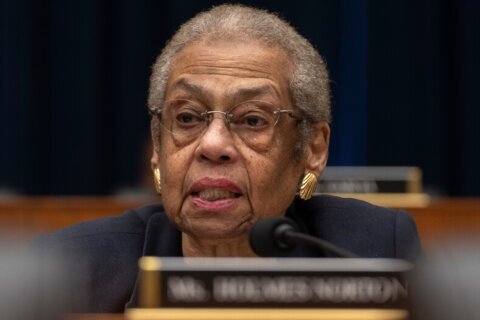On Thursday, D.C. Mayor Muriel Bowser urged the D.C. Council to pass a law allowing marijuana to be sold commercially in the city, promising more tax revenue and more jobs.
Since the city broadened the legal boundaries of marijuana a few years ago, it’s also been hampered by pushback from congress, which forbids the city from spending any money at all to further legalize the drug. But while the legality of legalizing the commercial sales of marijuana is debated, some in the city are also asking if it’s the right thing to do.
Will Jones is a Deanwood resident involved in the group Smart Approaches to Marijuana, or SAM, and he’s been on the forefront of trying to slow down the legalization of marijuana in the city.
“When I walk out the front door of my house in any direction, the first store I get to is a liquor store,” said Jones. And if he walks further and gets to a convenience store “it’ll be so plastered with advertisements for alcohol, for tobacco, for the lottery, that I can’t even see inside the windows of that store. That’s the reality for many people in communities like mine across Washington, DC.”
Jones says if you don’t believe him, check out the situation in Denver, where marijuana is fully legalized.
“They have one pot shop for every 47 residents in communities of color,” said Jones. “This is what the industry is going to do. They’re out to make as much money as they can, wherever they can, and disadvantaged communities are disproportionately targeted.”
He says SAM isn’t interested in overturning medical marijuana laws nor is he advocating that the current setup in D.C. be scrapped too.
“You can grow it here, you can have six plants which actually is a lot,” said Jones. “You can share it with people. If you want to do it, have fun. Grow it, use it, great. It’s legal. But to say that we should allow commercial industry, that’s a step too far.”
Jones, who also works as a D.C. firefighter east of the river, sees the impact that legal and illegal drugs can have on people. He warns that with companies so heavily invested in tobacco and alcohol now branching off into marijuana, you’re likely to see similar marketing practices that include the targeting of people who by law won’t be able to use marijuana.
“It’s the same players,” Jones said.
“It’s not just because of the predatory marketing practices, but there are also negative consequences,” he warns. “In states that have legalized there’s been an increase in young people that are smoking marijuana which is kind of what you’d expect.”
“The reality of these companies is that they target youths,” he adds. “You only have to look at for example Juul with vaping … there’s been an increase just the past couple years where smoking amongst youth was on the decline. We’re starting to see an uptick again.”
He says it’s “incredibly naive” to think marketing practices will change if commercial sales of marijuana are suddenly legalized.








